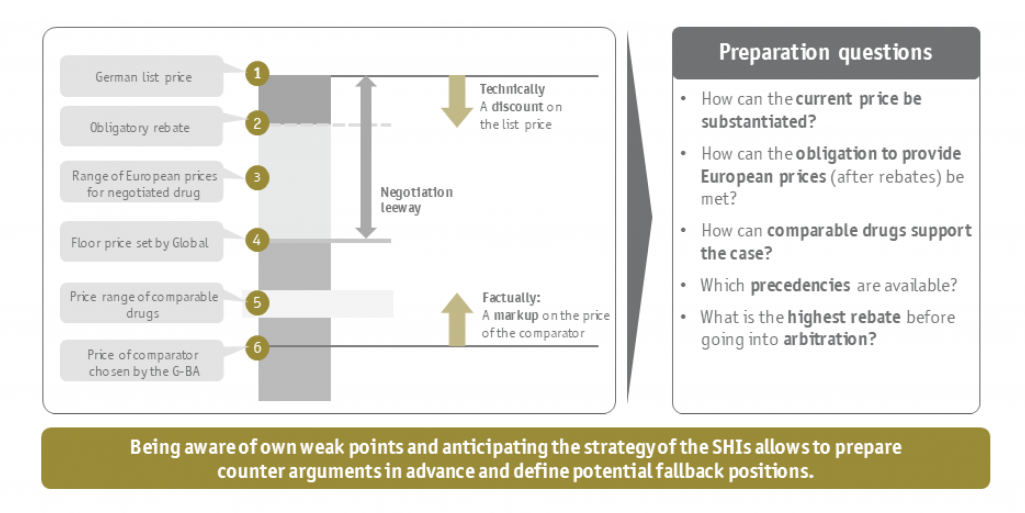Negotiation support
The challenge
A multitude of parties involved - a multitude of different interests
In the market access process, negotiations usually happen at the end of a procedure and concern the negotiation of a suitable reimbursement concept and a direct reimbursement amount, which usually have to be negotiated between payers or their associations and companies. The interests at hand between the negotiating parties can contain strongly opposing, but also common components. In addition, negotiations in the market access process are characterized by enormous political and economic expectations on both sides. While the negotiators on the national payer side manage limited resources and are interested in reimbursing novel and innovative products as cost-effectively as possible within the meaning of the SGB V, the representatives of the mostly internationally active companies are under great performance pressure, since negotiated contract concepts and reimbursement amounts have a significant influence on the success of the company. Cultural differences also exist between representatives of associations or members of public corporations and profit-oriented corporations.
Uneven spread of information and experience
For many companies, negotiations with health care payers, such as the German National Association of Statutory Health Insurance Funds (GKV-SV), as well as contract negotiations with individual health insurance funds, constitute a particular challenge. The huge cumulative experience of the health insurers' negotiating teams, which are limited to just a few people, meets naturally less experienced or unroutinized negotiators on the industry side, who are often introducing an innovative product to the German or European market for the first time. In addition, the SHIs have direct access to health care data from their own system and, as regular members of the Federal Joint Committee, are involved in the overall decision-making process on the benefits and additional benefits of the innovation.
The solution
Negotiation success can be shaped
The key to a successful negotiation lies in the interplay of a well considered negotiation strategy, intensive preparation and a sound and argumentatively objective conduct of the negotiation. Depending on the respective product and the chosen negotiation format, we develop comprehensive negotiation strategies together with our clients and train the lead negotiators in individual simulation rounds on possible scenarios.
Just as important as a coherent negotiation strategy is the correct and value-based argumentation of a price rationale, on which a reimbursement price can be argued factually. The design of a negotiation strategy in the context of the market access process is therefore strongly linked to the components of a price strategy and can hardly be separated from one another.
Our approach
Finding common interests and understanding interrelationships
Our specific SKC approach to negotiation is fed on the one hand by the Harvard concept of fact-based negotiation and integrates on the other hand specific aspects of systemic consulting. Particularly in light of the existing multitude of divergent interests between the negotiating parties, we try to identify common interests and approximate a constructive and mutually agreeable solution. Our support and consulting services are generally divided into the following structural elements:
-
Negotiation strategy
Together with our clients, we develop goal-oriented negotiation strategies that optimally prepare you for pending negotiations and take into account several possibilities and alternative scenarios. Our long-standing consulting activities for all types of payers enable us to anticipate the position of the negotiating partners with a high degree of predictive reliability.
-
Negotiation training and simulation
With our own training plan and by using training cases from the Program on Negotiation of the Harvard Law School, we train teams and individual negotiators on the basics of negotiation psychology, negotiation tactics and, for example, emotional control. We conduct realistic individual simulations of negotiation rounds for the optimal preparation of negotiation teams.
-
Negotiation leadership
At the request of our clients, we take the lead in price and contract negotiations with the other party. Our negotiators rank among the consultants with the greatest cumulative experience in the system.
-
Preparation and support of the price negotiation with the German Statutory Health Insurance (GKV-SV) according to §130b SGB V
In the context of the AMNOG procedure for pharmaceutical products, we accompany, advise and support you in the entire process of price negotiations with the GKV-SV, including any possible arbitration proceedings. Based on our cumulative experience in a wide range of indication areas, we can provide our clients with comprehensive advice on all issues and negotiation situations.
-
Preparation and support of the price negotiation with the German Statutory Health Insurance (GKV-SV) according to §134 SGB V
The negotiation of reimbursement prices outside of the pharmaceutical sector now also takes place for digital health applications (DiGA) due to the new DVG. We support you in developing a pricing and negotiation strategy and accompany you through the entire negotiation process, including any possible arbitration proceedings. You can find out more about the application process and our consulting services for DiGA here.
-
Negotiation support in contract negotiations with health insurance companies
In addition to negotiating general reimbursement or discount agreements, individual contracts can also be concluded with health insurance funds or health insurance associations or corresponding service companies. This includes, among other things, the negotiation of selective contracts within the framework of §140a SGB V for "special care", or contracts for outpatient specialist care according to §116b SGB V.
-
Support in the negotiation of innovative contract concepts (e.g. pay for performance)
The term "novel contract concepts" refers to a range of performance-based contract interpretations. Novel contract concepts are receiving increasing attention, particularly due to the advancing approval of gene therapies and ATMPs.
-
Moderation of negotiations between contracting parties
Due to the often perceived diametrically opposed positioning of the contracting parties in the healthcare sector (payers vs. industry; payers vs. service providers), negotiations are often inefficient, sometimes delayed for years or come to a complete standstill. Because we know and understand both parties, we successfully act as skilled moderators in deadlocked or highly conflictual negotiation processes.
-
Arbitration support
In arbitration proceedings, we support our clients with a risk assessment, prepare possible scenarios based on comprehensive precedent analyses with the help of our MAIS database, assist in the preparation of the substantiating applications, prepare the negotiating team for the arbitration proceedings strategically and tactically, as well as methodically, and accompany the negotiating team operationally during the proceedings. We participate in the arbitration proceedings as part of the negotiating team or as a member of the arbitration board representing the pharmaceutical company.
Get in touch

Founder and Managing Director
Fax: +49 511 64 68 14 18

